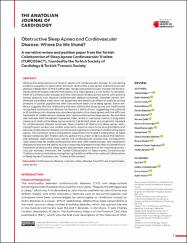| dc.contributor.author | Başaran, Özcan | |
| dc.contributor.author | Peker, Yüksel | |
| dc.contributor.author | Akdeniz, Bahri | |
| dc.contributor.author | Altay, Servet | |
| dc.contributor.author | Balcan, Baran | |
| dc.date.accessioned | 2023-06-13T07:00:20Z | |
| dc.date.available | 2023-06-13T07:00:20Z | |
| dc.date.issued | 2023 | en_US |
| dc.identifier.citation | Peker Y, Akdeniz B, Altay S, Balcan B, Başaran Ö, Baysal E, Çelik A, Dursunoğlu D, Dursunoğlu N, Fırat S, Gündüz Gürkan C, Öztürk Ö, Taşbakan MS, Aytekin V. Obstructive Sleep Apnea and Cardiovascular Disease: Where Do We Stand? Anatol J Cardiol. 2023 Jun 7. doi: 10.14744/AnatolJCardiol.2023.3307. Epub ahead of print. PMID: 37284828. | en_US |
| dc.identifier.issn | https://jag.journalagent.com/anatoljcardiol/pdfs/AJC-23962-REVIEW-PEKER.pdf | |
| dc.identifier.uri | https://hdl.handle.net/20.500.12809/10773 | |
| dc.description.abstract | Obstructive sleep apnea is common in adults with cardiovascular disease. Accumulating evidence suggests an association between obstructive sleep apnea and cardiovascular disease independent of the traditionally recognized cardiovascular disease risk factors. Observational studies indicate that obstructive sleep apnea is a risk factor for development of cardiovascular disease and that alleviation of obstructive events with positive airway pressure may improve cardiovascular disease outcomes. However, recent randomized controlled trials have not supported the beneficial effect of positive airway pressure in cardiac populations with concomitant obstructive sleep apnea. Some evidence suggests that the relationship between obstructive sleep apnea and traditionally recognized cardiovascular disease risk factors is bidirectional, suggesting that patients with cardiovascular disease may also develop obstructive sleep apnea and that efficient treatment of cardiovascular disease may improve obstructive sleep apnea. Recent data also indicate that the apnea-hypopnea index, which is commonly used as a diagnostic measure of obstructive sleep apnea severity, has limited value as a prognostic measure for cardiovascular disease outcomes. Novel markers of obstructive sleep apnea-associated hypoxic burden and cardiac autonomic response seem to be strong predictors of adverse cardiovascular disease outcomes and response to treatment of obstructive sleep apnea. This narrative review and position paper from the Turkish Collaboration of Sleep Apnea Cardiovascular Trialists aims to update the current evidence about the relationship between obstructive sleep apnea and cardiovascular disease and, consequently, raise awareness for health professionals who deal with cardiovascular and respiratory diseases to improve the ability to direct resources at patients most likely to benefit from treatment of obstructive sleep apnea and optimize treatment of the coexisting cardiovascular diseases. Moreover, the Turkish Collaboration of Sleep Apnea Cardiovascular Trialists aims to contribute to strengthening the efforts of the International Collaboration of Sleep Apnea Cardiovascular Trialists in this context. | en_US |
| dc.item-language.iso | eng | en_US |
| dc.publisher | Turkish Society of Cardiology | en_US |
| dc.relation.isversionof | 10.14744/AnatolJCardiol.2023.3307. | en_US |
| dc.item-rights | info:eu-repo/semantics/openAccess | en_US |
| dc.subject | Cardiovascular disease | en_US |
| dc.subject | Coronary artery diseas | en_US |
| dc.subject | Heart failure | en_US |
| dc.subject | Hypertension | en_US |
| dc.subject | Sleep apnea | en_US |
| dc.title | Obstructive Sleep Apnea and Cardiovascular Disease: Where Do We Stand? | en_US |
| dc.item-type | article | en_US |
| dc.contributor.department | MÜ, Tıp Fakültesi, Dahili Tıp Bilimleri Bölümü | en_US |
| dc.contributor.authorID | 0000-0002-6384-6455 | en_US |
| dc.contributor.institutionauthor | Başaran, Özcan | |
| dc.identifier.startpage | 1 | en_US |
| dc.identifier.endpage | 15 | en_US |
| dc.relation.journal | THE ANATOLIAN JOURNAL OF CARDIOLOGY | en_US |
| dc.relation.publicationcategory | Makale - Uluslararası Hakemli Dergi - Kurum Öğretim Elemanı | en_US |


















